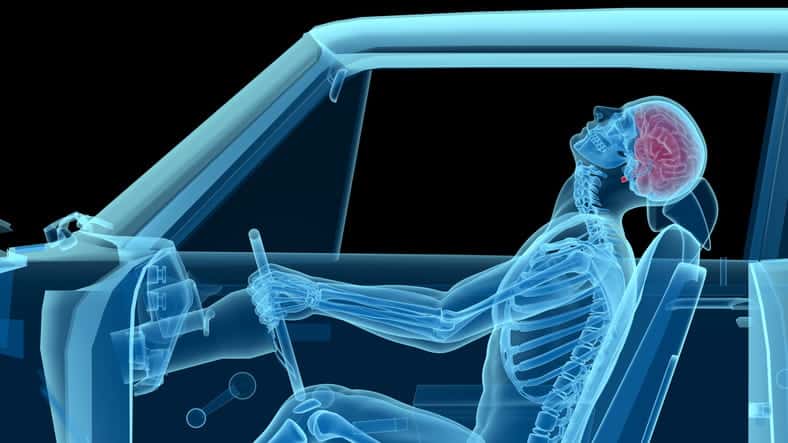
02 Apr Can You Get A Concussion From Whiplash?
Each year, approximately three million people in the United States suffer from whiplash. Injuries from sports and recreational activities account for up to three million concussions, a figure that does not include concussions from car accidents or falls.
Since whiplash is a neck injury and a concussion is a brain injury, you might be surprised to learn you can get a concussion from whiplash. Understanding whiplash, concussions, their relationship, and the common causes of these injuries can help you understand why you may have a legal claim for damages if you’re suffering from either or both injuries. Suppose you have grounds for a legal case. In that case, you can turn to a personal injury lawyer for help recovering the compensation you deserve.
If you have been injured in a car accident, call Sette Law today.
What Is Whiplash?
Whiplash is an injury affecting the neck and sometimes the spine. It’s caused by a snapping motion, which occurs when a person’s head snaps or is jolted in one direction and then the opposite direction.
Causes
Any incident causing a back-and-forth snapping of the neck can cause whiplash. Common causes include the following:
- Car accidents
- Falls
- Physical assaults
- Recreational injuries
- Sports injuries
Symptoms
Whiplash is a soft-tissue injury. It can damage the bones, discs, ligaments, muscles, and nerves in the neck and spine.
Depending on the injury’s severity and the parts of the neck and spine affected, people with whiplash may suffer some or all of the following symptoms:
- Back pain
- Blurred vision
- Difficulty sleeping
- Dizziness
- Fatigue
- Headaches
- Memory problems
- Neck pain
- Numbness or tingling in the arms
- Shoulder pain or tenderness
- Stiffness
- Tenderness
- Tinnitus
It’s common for whiplash to affect a person’s range of motion and for the pain to increase when they try to move their neck.
Treatment
Doctors use examinations and imaging tests, such as MRIs and CT scans, when diagnosing whiplash. These tests can rule out other potential injuries, helping doctors narrow down the causes of your symptoms. Treatments and treatment timelines vary based on the severity of the injury. Standard treatment methods include the following:
- Cold therapy
- Immobilization
- Medication
- Physical therapy
- Radiofrequency nerve ablation
- Spinal surgery
- Transcutaneous electrical nerve stimulation (TENS) therapy
Although it’s common for people to recover within weeks of suffering whiplash injuries, some suffer symptoms for months after their injuries.
What Is A Concussion?
Concussions are traumatic brain injuries. Concussions stem from head trauma, which a jolt, blow, or bump can cause. It’s possible to suffer a mild or severe concussion. In severe cases, concussions can be fatal.
Causes
Common causes of concussions include the following:
- Blows to the head
- Car accidents
- Explosions
- Falls
- Sports injuries
Symptoms
People with a concussion may suffer some or all of these common symptoms:
- Behavior changes
- Confusion
- Difficulty concentrating
- Dizziness
- Headache
- Loss of consciousness
- Memory loss
- Mood changes
- Motor control issues
- Nausea
- Sensitivity to light
- Sensitivity to noise
- Vomiting
People may also feel foggy or sluggish after suffering a concussion. Some people suffer permanent brain damage. Those suffering from repeated concussions, such as athletes, may develop chronic traumatic encephalopathy (CTE).
Treatment
Treatment for mild concussions includes rest and medication. During your recovery, you may need to suspend physical activities like sports. You may also need to avoid activities that aggravate your symptoms, including watching TV and playing video games.
Severe concussions may require surgery.
How A Concussion Can Happen From Whiplash
Whiplash occurs when a person’s head snaps back and forth. The focus is on the neck and spine, but the motion causing whiplash also jolts a person’s head and brain. The snapping motion can cause a concussion when you get whiplash.
Since the events causing whiplash can also cause a concussion, it’s crucial you seek medical care after an injury that causes your neck and head to snap backward and forward.
Whiplash And Concussions Are Common Car Accident Injuries
Car accidents are everyday occurrences. In 2020, car accidents in the U.S. injured more than 2.28 million people. While many may think the kind of car accidents causing extensive vehicle damage are the ones likely to cause injuries, whiplash often occurs after low-speed crashes that do not damage vehicles. Up to 68% of rear-end accidents occurring at low speeds cause injuries, with 50% of those injuries affecting the neck. One in ten of these injury victims suffer permanent damage.
Concussions are also a common car accident injury. Since some symptoms of whiplash and concussion are the same, doctors may use imaging scans to verify or rule out these injuries after their accident.
Can I Sue If I Have Gotten Whiplash And Concussion In A Car Accident?
It’s crucial you take the appropriate steps after a car accident to protect your rights in case you need to file a lawsuit. California allows a car accident victim to file a claim against the person responsible for their injuries if the victim can prove the at-fault party was negligent.
Proving Your Case
Winning a car accident claim involves:
- Identifying the at-fault party
- Gathering evidence to demonstrate the at-fault party was negligent
- Establishing their negligence caused your injuries
Negligence occurs when a person acts in a way most people would not act under the same circumstances or fails to act in the way most people would act in the same circumstances.
Suppose a person’s drinking coffee while driving. They hit a pothole and spill hot coffee on themselves. They hastily set the drink in the cup holder and reach for the glove compartment to find a napkin. When they reach for the glove compartment, they take their eyes off the road and don’t notice changes in their driving conditions. Their delayed response to changes in driving conditions causes your accident. In that case, you can argue that their negligence resulted in distracted driving, which caused an accident.
Gross negligence occurs when a person is deliberately reckless despite knowing their inactions or actions are likely to harm others. Suppose a person decides to have a street race in a residential area. This is a deliberate choice to break the law and engage in an activity that increases the likelihood of causing a car accident and could support a gross negligence claim.
Filing Deadline
California gives car accident victims 24 months to file a claim. There are some scenarios where the deadline could be extended. Suppose you weren’t aware of your injuries, you were a minor when the accident occurred, or you were in a coma after your accident. These factors could justify a filing extension.
The filing deadline is shorter if you’re in a collision with someone working for a government agency.
Damages Victims Can Seek
All car accident victims can seek monetary and non-monetary damages. Monetary or economic damages are compensation for accident-related costs incurred or anticipated, such as:
- Childcare costs
- Lost income
- Medical bills
- Property damage costs
- Transportation expenses
Non-monetary or non-economic damages compensate for the accident’s impact on you and your life. Grounds for non-monetary damages include the following:
- Anxiety
- Depression
- Grief
- Loss of intimacy
- Loss of quality of life
- Pain and suffering
- Post-traumatic stress disorder (PTSD)
You can seek punitive damages if the at-fault party is guilty of gross negligence. Since punitive damages are a punishment for the at-fault party’s conduct, victims can only seek them if they can prove gross negligence was a factor.
If You Have Suffered An Injury In A Car Accident, Let The Experts At Sette Law Help You

Contact Sette Law to discuss your Sacramento car accident or any other injury causing whiplash or concussion. Our car accident attorneys are personal injury lawyers experienced with head and neck injuries and can prepare your case.
We will handle the accident investigation and gather all evidence to support your claim. Our legal team will also help you calculate the damages you seek, ensuring we fight for you to receive all the compensation you deserve. We’ll use this evidence to negotiate a settlement with the at-fault party’s insurance company. If we can’t agree on a fair settlement, we’ll present your case in court and fight for the maximum compensation available.
We charge contingency fees, so you only pay us a percentage of your settlement when we win your case. This ensures that legal fees don’t stop you from seeking the justice you deserve.
Let Sette Law help you recover the car accident damages you are entitled to.
Sources:
Concussions. (2024).
Concussions Facts and Statistics. (2024).
Crash Facts/Whiplash Statistics. (2024).
deDianous, D. (2023). Understanding whiplash: Roadmap to relief and recovery.
Number of road traffic-related injuries and fatalities in the U.S. from 1990 to 2020. (2024).
